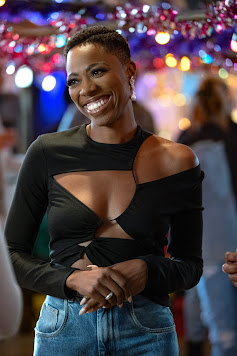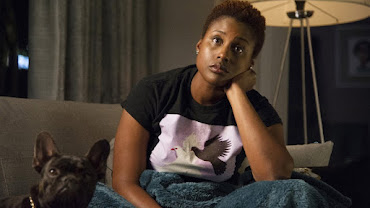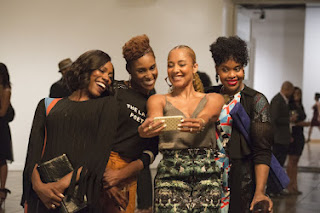Of course I'm being facetious with the title of this blog post. Even those who haven't watched a single episode of Insecure are sure to have at least heard of its powerhouse, multi-hyphenated star and show creator, Issa Rae, who took her "The Mis-Adventures of Awkward Black Girl" (ABG) YouTube series in 2011 and parlayed it into a 30-minute sitcom and runaway hit over at HBO in 2016 that garnered upward of over a million viewers each of its five seasons. Although ABG dealt singularly with Rae's many, well, awkward adventures while navigating life as a twenty-something, single, African-American, Los Angelean, the HBO sitcom would partner her with a cast of characters as besties also on a similar journey in figuring out this thing called life.

Enter Molly Carter, the sharp-dressed attorney/homegirl and ride-or-die friend that Issa's character would describe as someone "white people lovvveeddd and black people lovveddddd." Then there was Kellie Prenny, the sexually liberated, financier who would never enter or leave a room without dropping a (often inappropriate) quip that would leave everyone in stitches. And rounding out the crew was Tiffany DuBois, the conservative, boo'd-up-since-college, wife, publicist and AKA sorority sister to Molly. Mix this cast of characters with a sprinkle of the highs and lows of dating, job woes, family drama, a few freestyle raps, and you got the hit we've all come to know and love, and whose ending we now mourn. On Sunday night, Insecure dropped its equally anticipated yet dreaded series finale for those of us who saw ourselves as the fifth friend of this squad that we got together and "ki-ki'd" with each Sunday night. We wanted to know where they'd go from here? What we'd do without them? But most importantly, we wanted to know where--or make that who--Issa's character would ultimately end up with?
In season 1, episode 1, we found Rae's character lamenting a five-year relationship with boyfriend, Lawrence, that felt like it was going nowhere, in particular after he had lost his job, was attempting to create a new app and probably, unbeknownst to himself and Issa, was existing in a state of depression. Rae's character would also comment that four of those five years saw Lawrence
trying to get himself together. After his dropping the ball on celebrating her birthday, leading Issa to hit up a nightclub with Molly and "coincidently" run into Issa's ex, Daniel, the series would take us on an additional five-year rollercoaster ride of breakups, makeups, side chicks, side dudes, baby mama drama, career changes, friendship fallouts and makeups, and even a shot in the eye (if you know, you know. LOL). Alliances were created in the form of the "Issa Hive" and the "Lawrence Hive," i.e., viewers taking sides on how both characters should navigate life without the other character. And all the while Molly, Kellie, and Tiffany would navigate equally--if not more challenging life obstacles--postpartum depression, the death of a parent--hell, even one character's
own death (hey, you'd have to see it to understand), reinforcing how the uncertainties
of life can often leave us feeling insecure about the choices we've made
in life.

However, we trusted by the end of the series--as we often hope for ourselves--we'd see a glow-up for all of the characters that would make all of the lessons learned and hardships endured worth it. And in many ways Insecure hit its mark: Molly, after more failed relationships than we care to count, found herself at the altar with, as one viewer put it, her "economic equal" and law firm colleague (who she once saw as her nemesis), loving her safely and unconditionally like she always wanted and deserved. Kellie who, for as long as viewers can remember, rallied against the idea of parenthood, unexpectedly announced her pregnancy after a year-long relationship with a partner who, from the few words spoken and calming energy he exuded, let viewers know he just lets Kellie be Kellie, which is always what she needed. And Tiffany, who begrudgingly (and fearfully) moved with her husband and toddler to Denver in the middle of the final season was slowly finding her new stride all while being pregnant with a new life. And then there was Issa.

In all fairness, Issa's character experienced her share of life-changing pivots during the series as well--quitting her job at the "We Got Y'all" nonprofit, which assisted inner city youth, without having a real career path plan in place and taking a gig as an Uber driver and an apartment manager in the interim to make ends meet; embarking on relationships with a few promising suitors (who she ultimately sabotaged futures with); and stepping out on faith to throw her own neighborhood block party to showcase local talent. Ultimately, the latter, would lead her to her true passion in the last two seasons in the form of starting her own nonprofit--The Blocc--designed to help artists of color in L.A. find spaces and platforms to showcase their work. Even a huge blowout with Molly in season four, which threatened to end the friendship forever, found her more introspective and them closer than ever by the series end. Yet the proverbial cloud that hung over the series for five seasons was whether Issa and Lawrence would find their way back to each other. And, spoiler alert, they did.

Despite the history of cheating on both of their parts, ultimately leading Lawrence to a new relationship that would produce a son and Issa struggling to accept his new reality, the "love conquers all" adage reared its head and the closing scene showed Issa leaving her nonprofit's new brick-and-mortar office in L.A, cruising in her new Lexus to her new home, and opening the door to find Lawrence and his now pre-school aged son waiting with a cake to wish her a happy birthday. The sparkling diamond on Issa's left hand let viewers know without a word being uttered about it that the two were now engaged. Mic drop. Series end.
Like most, I was filled with a mix of emotions: joy that each character seemed to have found their happy ending; sad that they'd no longer be there each week to provide us the much needed escapism from our own realities. Afterward, there was time spent on social media platforms enjoying the shared feelings and much-deserved praise for Issa and her writing team's ability to create storylines that engaged viewers across demographics (case and point, on the night the finale aired, I got calls from one of my sisters who is in her 60s as well as texts from my nephews who are in their 20s, all wanting to discuss the show's end and how they felt about the choices each character made).

Then there was the group texts between friends sharing their thoughts on possible alternate endings, reminiscing on situations that got the characters to where they are, and creating imaginary futures for them beyond the show's end. I crawled into bed spent yet seemingly at peace, but--as a friend I spoke with later likened to a stomach bug--something was bothering me but I wasn't sure what it was. Then it hit me: Issa hadn't really grown as much as she was being credited with, making the celebration of her "happily ever after" a bit questionable. I immediately grabbed my phone and shared my "a ha" moment with a friend and she quickly replied that there was a reason she couldn't sleep either, and she wasn't sure why until I had possibly unearthed the reason: the return to Lawrence was a bit unrealistic and, as one person tweeted, somewhat irresponsible (as evidenced by the number of viewers contemplating calling ex's and getting that old thang back) leaving an unsatisfying taste in my mouth.
Now don't get me wrong: anyone that knows me knows I'm the biggest champion you can find for Black Love. But I'm also well aware how most women approach and process breakups, especially when the woman is the "breaker-uper." Issa set in motion the breakup with Lawrence in season 1. And although women are often labeled as being "emotional," when it comes to break-ups we're largely analytical, meaning we've turned that thing around in our heads a million times, back and forth, up and down, and running multiple scenarios of the aftermath before actually pulling the trigger. It's rarely done haphazardly nor with huge regret. Sadness? Of course. Regret, not often.
Yes, there are exceptions to every rule but, it's for that reason that when women initiate break-ups, they often don't return to those relationships--ever--which makes Issa's being stuck in this regret for five years, even having it overshadow almost every decision she made, only to have her return, unthinkable. Unlike Molly et al., who used their failed relationships to propel them forward toward growth, Issa's relationship became a proverbial albatross around her neck that she was never able to unshackle herself from all the way to the final frame. And as my friend pointed out, a framing shot in which she didn't even appear authentically happy. In fact, it was a decision we felt was primarily motivated out of fear of letting her past life completely go and out of an angst of seeing everyone move on to their new lives quicker than she anticipated. Lawrence was always "home base"; a safe space she needed. And we all know when you're in need more than you're in want, your decision making can be greatly impaired. And that's when I realized this was Molly's show all along.

If fans are honest with themselves, that warm joy we felt as the credits rolled were really about Molly's story arc, not Issa's. When we first met Molly, she was overworked at her firm, holding her family together, maneuvering through multiple dating apps, and juggling hope and heartbreak like a champ. She tried on various relationships and, when they didn't quite fit, she wasn't afraid to move on and trust love again. We watched her challenge herself by dating outside of her race--a suggestion many African-American women have shunned in keeping hope alive for their IBM (ideal black man)--and when roadblocks would emerge in both her relationships and career, Molly ultimately did the bravest thing one can do: admit she might be her own biggest obstacle and got herself a black therapist to help her navigate this thing called life. In the end, she was thriving at an all-black-law firm (no longer shackled by the corporate myth that it has to be "white to be right"); had taken the reigns on securing her parents financial future in the nick of time (shoutout to Kelly with the assist); and had experienced enough self growth along the way to usher in the love of her life. Now THAT's a glow up and the personification of going from insecure to secure AF. Which is why Issa's constant back track to a relationship that never brought out the best in her felt like somewhat of a letdown.

Ultimately, what Issa did was constantly change but not necessarily grow. And that became the greatest lesson we could've all taken from the ending of this series just as we prepare to exit one year and enter into the next. Do our new years resolutions, next moves, or future plans reflect areas that will promote growth or are we simply changing, be it jobs, relationships, area codes, or social circles? One of my favorite sayings is "wherever you go, there you are." If the change is not deep within; if we're not engaging in activities, behaviors, self-care, or relationships that promote growth from our core, then all we're doing is moving in circles, not really going anywhere or--perish the thought--returning to the old familiar when the going gets tough (a la Issa and Lawrence).
Hell, perhaps their love story was true love after all and so their reconnection was kismet. But while we celebrate the now cultural icon that is Insecure and many laud Issa's character for finding her way back to Lawrence, I'm choosing to give Molly "all her things" for reminding us all that the greatest relationship you can ever have--even before finding true love--is the one you have with yourself, and that that discovery of self is most often found by having the courage to move forward and move forward boldly. As a wise person once said, "If you're scared to go, go scared."
And to the actresses--Issa, Yvonne, Natasha, and Amanda--who portrayed these characters courageously for five seasons and allowed us to see ourselves, celebrate ourselves, laugh at ourselves and, ultimately, forgive ourselves, you deserve it all. We don't know what we're going to do without you, but we're grateful for the reminder you gave us of what we
can do with love, laughter, Black Girl Magic, and a little bit of help from our friends. Kudos, ladies, and Happy New Year to all of my Sistas! May the glow up be within your grasp.
Photo Credits: N/A





























